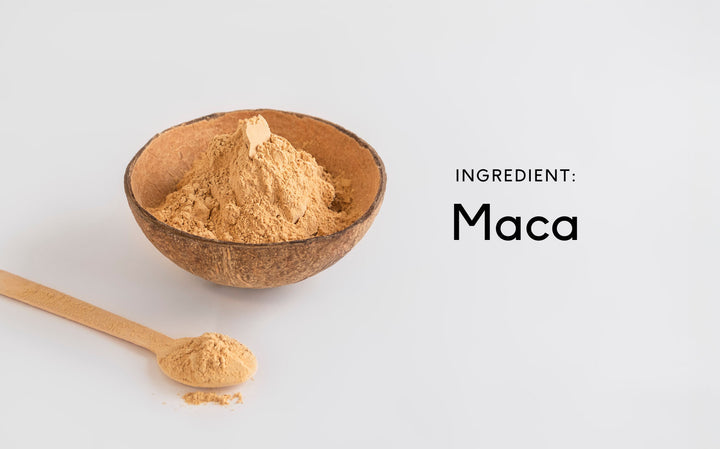Learn About Manganese in 5 Minutes
Table of contents

What is manganese?
Manganese is an essential nutrient and a powerful antioxidant, and it helps with diabetes, blood flow, and thyroid hormone stabilisation.
- Improves bone health to prevent fractures and osteoporosis
- Powerful antioxidant action reduces your risk of various diseases
- Stabilises blood sugar to prevent diabetes
- May prevent seizures and strokes by increasing blood flow to the brain
- Helps balance your thyroid hormones
- May stimulate collagen production to make your skin healthier
Why we love manganese
Manganese is one of the most underrated minerals. Your body needs plenty of manganese to survive, and this nutrient prevents and reduces the symptoms of tons of different diseases.
Along with zinc, copper, and calcium, manganese protects your bones by improving your bone mineral density. Since it is a vasodilator, it helps blood flow to your brain and other parts of your body. Perhaps most importantly, manganese also helps regulate your thyroid activity, which may improve your energy levels.
Unbelievable Benefits of Manganese
In the dozens of studies scientists have performed to learn more about manganese, there’s a clear consensus that this vitamin imparts incredible health benefits:
Bone Benefits
Manganese, copper, calcium, and zinc work together to improve spinal bone density. These minerals also appear to improve bone mass throughout the body.
Given that more than one-third of older people will experience osteoporosis-related fractures, it’s never too early to make sure that you keep up with your manganese intake. The better maintain your bones, the less likely it will be that you’ll experience problems with bone density later in life.
Blood Sugar Benefits
People with diabetes have lower levels of manganese in their bodies. Scientists aren’t sure whether manganese deficiency causes diabetes or diabetes causes manganese deficiency, but the link between the two conditions is clear.
Your pancreas produces insulin, and this organ contains tons of manganese. Studies suggest that ingesting manganese could stimulate insulin production in your pancreas, which would help with the symptoms of diabetes.
Manganese helps activate many enzymes in metabolism, essential for energy production. That's why 0.6mg of Manganese is included in the Feel Meal Replacement blend.
Neurological Benefits
As an antioxidant, manganese prevents free radicals from harming your nervous system. In addition, when manganese binds with neurotransmitters, it makes these chemical messengers more efficient, which may boost your brain function. Taking too much manganese could hurt your nervous system, so we only include the exact dose you need in Feel.
Scientists have linked low levels of manganese with seizures. It’s possible that this effect is related to manganese’s action as a vasodilator; since it widens your blood vessels, this mineral reduces your risk of stroke.
Thyroid Hormone Benefits
Manganese is involved in the production of thyroxine, which is one of the most important components of the thyroid system. Not having enough thyroxine in your body could contribute to hypothyroidism, which leads to weight gain and low energy levels.
Other Benefits
Your body can’t produce the enzyme superoxide dismutase without manganese. This enzyme protects your cells from oxidation, and it appears that superoxide dismutase prevents heart disease and reduces the symptoms of arthritis.
Antioxidants protect the tissues in your body from oxidative stress no matter where they are, which means that manganese may protect you from a variety of medical conditions. This antioxidant action also appears to reduce inflammation throughout the body, so manganese might improve the symptoms of conditions like degenerative bone disease and synovitis.
Is manganese water-soluble or fat-soluble?
Due to its combination with glycinate, this type of manganese is water-soluble. Therefore, the body processes this mineral quickly, and it doesn’t build up in your system except in cases of overdose.
Where can manganese be found naturally?
Certain types of seafood are rich in manganese, and this essential nutrient is also available in various nuts and grains. However, people who are either allergic to seafood or are on meat-free diets may have trouble getting enough dietary manganese.
5 foods/drinks containing manganese
1. Mussels 100% DV per 28g or 1 medium-sized mussel
2. Hazelnuts 80% DV per 28g
3. Pecans 55% DV per 28g
4. Brown Rice 55% DV per ½ cup or 64g
5. Pacific Oysters 50% DV per 85g
What is the recommended daily intake for manganese?
According to the National Institutes of Health (NIH), adult men should consume 2.3mg of manganese per day while women should consume 1.8mg. Consuming more than this amount of manganese could be toxic or even deadly.
What to consume to get a full daily dose of manganese?
Mussels - approximately 1 mussel or 28g
Hazelnuts - approximately 37g
Pecans - approximately 56g
Brown rice - approximately 128g
Oysters - approximately 170g
Can you absorb enough of manganese from food?
If you are a seafood lover, it’s relatively easy to get your daily intake of manganese from food. Otherwise, you’ll need to make sure to include plenty of hazelnut, pecan, or brown rice in your diet.
Why is manganese necessary for your body?
Like other essential minerals, manganese improves your bone density and reduces your risk of osteoporosis. Manganese is also one of the most important nutrients for proper pancreas activity, and this organ produces the insulin you need to avoid developing diabetes. Plus, the antioxidant activity of manganese appears to improve your neural signalling, and this substance also helps your thyroid system operate effectively.
Functions of manganese
Thyroxine production: Manganese is essential to the production of thyroxine, which is one of the most important components of the thyroid system.
Antioxidant action: This essential mineral reduces levels of free radicals in your body and prevents oxidative stress.
Bone density functions: Manganese works with other essential minerals to prevent osteoporosis.
Insulin production stimulator: By aiding the proper operation of your pancreas, manganese improves your body’s ability to produce insulin.
Symptoms of manganese deficiency
Skeletal Defects
Since manganese is essential to bone health, children who do not receive enough manganese in their diets can develop skeletal defects. In some cases, manganese supplementation may reverse these effects.
Glucose Maintenance Issues
While it’s unclear whether manganese deficiency can actually cause diabetes, not having enough glucose impairs your glucose maintenance abilities, which can lead to pre diabetic symptoms.
Abnormal Nutrient Metabolism
Due to its involvement in proper thyroid functioning, impaired manganese levels can interfere with your body’s ability to process fats and carbohydrates. These issues can lead to weight loss and reduced energy levels.
How long do you need to take manganese to start experiencing its benefits?
Due to its combination with glycinate, this type of manganese is water-soluble. Therefore, the body processes this mineral quickly, and you may start to feel a difference within 1-2 days.
Consistency is key and our research recommends taking your Feel supplements for at least 3 months to allow your body to adjust and provide the desired benefits.
How long does it take for your body to digest/absorb manganese?
While it’s estimated that you only absorb about 5% of the manganese you ingest in food, some estimates contend that manganese gluconate has an absorption rate of up to 30%. Unlike most nutrients, which are excreted in urine, manganese is excreted in bile and faeces.
How long does manganese stay in your body after you take it?
While most of the manganese you ingest is excreted within 24 hours, a sizeable portion of dietary or supplemental manganese remains in your bones and pancreas for a significant amount of time. When your body has used this stored manganese, it is excreted.
Is manganese an antioxidant?
Yes, manganese is a powerful antioxidant. Therefore, it reduces inflammation and oxidative stress by reducing the impact of free radicals on your cellular integrity.
Can you overdose on manganese? What are the effects?
While manganese is an essential nutrient, taking too much of this mineral can be deadly. In high doses, manganese is a neurotoxin, and symptoms of manganese overdose include muscle tremors, headaches, hallucinations, and neurodegenerative disorders. Avoid these symptoms by consuming the exact amount of manganese you need per day in Feel.
Does manganese dissolve, flush out, or build up in the body?
The vast majority of the manganese you consume is excreted rapidly. However, this substance does build up in the adrenal glands, pituitary gland, pancreas, kidneys, and bones. Even the manganese that builds up in your organ and bone tissues is excreted eventually.
Can you take manganese during a diet?
Manganese does not interfere with any dietary restrictions. If you already get a large amount of manganese in your diet, however, you may want to be careful when supplementing with manganese to avoid overdose.
Are there synthetic forms of manganese?
Elemental manganese is extremely difficult, if not impossible, to synthesise. The glutamic acid with which this mineral is bonded to make manganese, however, is synthesised in a laboratory environment.
Why might synthetic forms of manganese be better?
If elemental manganese were ever unavailable for human consumption, it would be necessary to synthesise this mineral.
Absorption rate of synthetic manganese
Theoretically, an artificial form of manganese would also enjoy the high absorption rates typical of this type of manganese.
Why might natural forms of manganese be better?
The only available type of elemental manganese available is naturally-derived.
How to take manganese
Manganese can be consumed in food or in supplement form.
Manganese trends in medicine
A recent study highlights the double-edged nature of manganese when it comes to nutrition. This 2019 research links exposure to dangerous levels of manganese with the development of Parkinson’s disease. People who work in steel mills and other industrial environments may be exposed to dangerous levels of manganese, but ingesting the RDA of this substance will actually reduce your chances of developing neurodegenerative conditions like Parkinson’s.
Why everyone should be taking WeAreFeel supplements
As we were developing Feel, we were dismayed that many of the most popular multivitamins contained dangerously high doses of tricky minerals like manganese. You need manganese to stay healthy, but if you ingest too much of this mineral, you could experience disastrous health consequences.
In Feel, we only include the exact amount of manganese you need to stay healthy while avoiding the risk of overdose. Don’t leave your health to chance; get your exact RDA of manganese with a daily capsule of Feel!




















































 Back
Back





